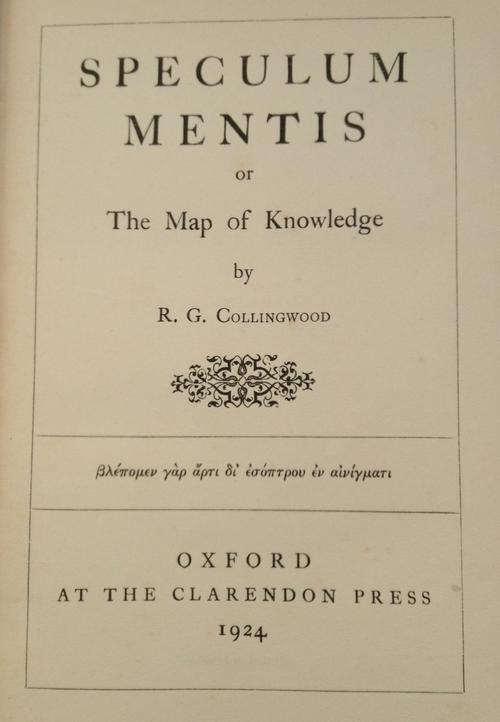Speculum Mentis or The Map of Knowledge
R.G. Collingwood (1924)
 The anthropologist-systems thinker Gregory Bateson recognized RG Collingwood as one
of his intellectual heroes, noting that no one possessed a surer grasp of context than RGC.
This accolade prompted me to examine closely Collingwood’s Speculum Mentis: The Map
of Knowledge (1924), an ambitious attempt to resolve the immensity of Nature. I was not disappointed. Immediately obvious is that Collingwood sees clearly the difficulty in making sense of the world. He puts forth the question: Who will give us the truest view of the world — the artist, historian, philosopher, scientist, or theologian? He quickly finds the solution to his big question will not come easily because, when asked, the artist will offer, ‘We see the world best through aesthetics, beauty’; the scientist will say, ‘We see best when we apply the scientific method’, and so on. Collingwood’s sobering conclusion: We can’t trust any of them.
And that’s when it hit me — It pays to be hyphenated. Historian-Theologians, Artist-Philosophers, and other hyphenated types are in the best position to side-step some of the limitations inherent in a single-minded approach to discovering. My personal bias is that we need more Poet-Scientists, scientific discoverers who care deeply about language. It will be through their writings that we will come to recognize more fully how the act of naming things limits the scientific method, so that a truer reality can be revealed. Emerson wrote: “What is life
but an angle of vision?” Collingwood’s idea echoes Emerson’s thinking, encouraging each of us to value the expertise of the multi-angled among us. If our goal is discovering the whole, it will pay to become hyphenated. Are you hyphenated yet? What are you waiting for?
The anthropologist-systems thinker Gregory Bateson recognized RG Collingwood as one
of his intellectual heroes, noting that no one possessed a surer grasp of context than RGC.
This accolade prompted me to examine closely Collingwood’s Speculum Mentis: The Map
of Knowledge (1924), an ambitious attempt to resolve the immensity of Nature. I was not disappointed. Immediately obvious is that Collingwood sees clearly the difficulty in making sense of the world. He puts forth the question: Who will give us the truest view of the world — the artist, historian, philosopher, scientist, or theologian? He quickly finds the solution to his big question will not come easily because, when asked, the artist will offer, ‘We see the world best through aesthetics, beauty’; the scientist will say, ‘We see best when we apply the scientific method’, and so on. Collingwood’s sobering conclusion: We can’t trust any of them.
And that’s when it hit me — It pays to be hyphenated. Historian-Theologians, Artist-Philosophers, and other hyphenated types are in the best position to side-step some of the limitations inherent in a single-minded approach to discovering. My personal bias is that we need more Poet-Scientists, scientific discoverers who care deeply about language. It will be through their writings that we will come to recognize more fully how the act of naming things limits the scientific method, so that a truer reality can be revealed. Emerson wrote: “What is life
but an angle of vision?” Collingwood’s idea echoes Emerson’s thinking, encouraging each of us to value the expertise of the multi-angled among us. If our goal is discovering the whole, it will pay to become hyphenated. Are you hyphenated yet? What are you waiting for?
- David Waters
Description from Nature by F.S. Marvin (1925)
MR. COLLINGWOOD has a tradition of art behind him and he has also made himself recently one of our leading authorities, if not the first of all, on Roman Britain. As he adds to this a profoundly philosophic mind, his attempt in this book is to survey the whole field of human thought. It is modest in expression though ambitious in scope, and will interest greatly those who like to trace a line of thought faithfully pursued by a thinker who wrestles hard with every conclusion, and gives the public nothing but what he has won from his own experience, intensely felt. The general thesis of the book is that the human mind, whether in the individual or in the race, passes through a series of experiences each of which is incomplete and partially corrected by the succeeding stage, until it rests at last in a philosophy of absolute or final worth based on the mind itself, enlightened by history…
